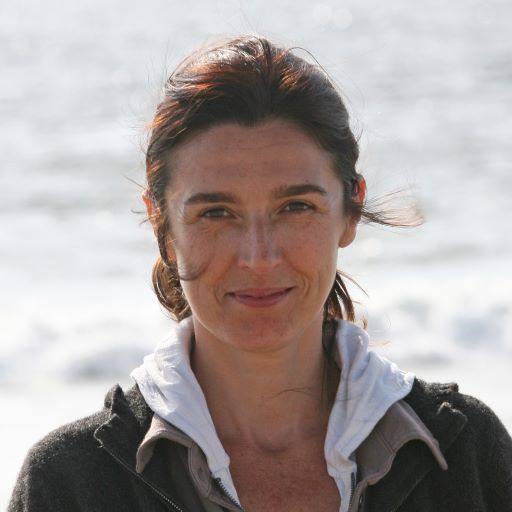FOR IMMEDIATE RELEASE
In Stranded Ocean Conservationist Finds Solace, Science, and A Call to Action in Everyday Nature
LA-based marine biologist Maddalena Bearzi charms and galvanizes in a new book that invites readers to embrace and defend the quotidian wildness in our own backyard
BERKELEY, CALIF. — When pandemic lockdowns stopped the world on a dime, seafaring scientist Maddalena Bearzi went from exploring the mysteries of the marine mammals teeming off the shore of the City of Angels to a life marooned on land. Having fought to save our imperiled seas for over twenty years, Bearzi knows the burnout of constant battle. When the pandemic’s paralysis took her out of action and kept her far from family, she returned to the curiosity that drove her into ecology. She charts this journey back to daily wonder at the natural world with warmth, charisma, and an activist undercurrent in Stranded: Finding Nature in Uncertain Times.
“Every anxious brain like mine […] on occasion needs some reprieve from stress,” writes Bearzi, who locates that reprieve by attuning to the natural habitats at her fingertips, even in the middle of the city. Her blossoming recognition of the marvel of life that surrounds us opens the door to other meditations. She invites us to perceive these alongside her, from our alienation from the more-than-human world to the rapacious growth of human-centered development choking out the life systems that sustain us.
With her trusty companion, a mutt named Genghis, by her side, Bearzi explores the nourishing connections of nature in urban LA. She observes with bemusement the anti-coyote hysteria of her neighboring Nextdoorians; she reconnects with her green-thumb mother from afar by cultivating a drought-resistant garden on a carbon-zero budget; and she interrogates the subtle systems of animal neuroscience, insectile social systems, and avian courtships thrumming all around us.
Bearzi offers this mindful attention to nature not only as a salve for interpersonal stress but also as the antidote to the apathy and paralysis of eco-anxiety occasioned by climate breakdown: “A virus, sooner or later, will either go away or become endemic; not this,” Bearzi cautions, “No jab can stop what we are doing to the only planet we have.”
Media Contact:
Kalie Caetano
Marketing & Publicity Manager
For review copies, feature interest, and interview and image requests, get in touch: publicity@heydaybooks.com
Advance Praise for Stranded by Maddalena Bearzi
“Marine biologist Bearzi celebrates the marvels of ordinary wildlife in these charming meditations. Collecting vignettes about the animals she observed while confined to her Los Angeles home during Covid-19 lockdown, she serves up thoughtful commentary on humanity’s place in nature and the value of all creatures.”
—PUBLISHERS WEEKLY
”Bearzi’s thoughtful and meditative essays will appeal to naturalists, conservationists, and anyone who appreciates all the other animals with whom we share this planet.”
—BOOKLIST
“Stranded is one of the first great pieces of environmental writing to emerge from the COVID-19 pandemic.”
—PETER S. ALAGONA, author of The Accidental Ecosystem
“What happens when a scientist, trained in the powers of observing wildlife, turns that curious eye on herself? Maddalena explores so beautifully her journey of reckoning with the wild wonder of the everyday world as she realizes what she has left unexplored is not just found in the vastness of the ocean but in her own backyard.”
—BETH PRATT, author of When Mountain Lions Are Neighbors
“Bearzi has found her place as a nature essayist of the highest order.”
—CRAIG STANFORD, author of Upright
“Maddalena Bearzi’s way with words is magical, and so is her ability to transform what seem to be ordinary animals into miraculous creatures doing outrageous things right under our collective noses. And she puts us humans in our place as Earth’s worst nightmare, but also the best hope for restoring and safeguarding the health of the only home in the universe just right for us—and the millions of other species that underpin our existence.”
—SYLVIA EARLE, author of Sea Change
“Stranded reminds us of what we all too easily forget: the sustaining delights of finding beauty and wonder all around us.”
—FLORENCE WILLIAMS, author of The Nature Fix and Heartbreak
“Maddalena ends with not just hope but teaching-words of personal responsibility, grassroots activism, and large-scale governmental and other action that may—may—help us in this amazing, rapidly advancing Anthropocene Epoch.”
—BERND WÜRSIG, coeditor of Encyclopedia of Marine Mammals

Maddalena Bearzi is president and co-founder of Ocean Conservation Society. She holds a PhD in biology and a postdoctorate from UCLA, and she has been involved in studying marine mammals, with a conservation bias, since 1990. Her research on dolphins and whales off California represents one of the longest investigations worldwide. She has published several scientific peer-reviewed papers, and she is coauthor of Beautiful Minds (Harvard University Press) and author of Dolphin Confidential (University of Chicago Press). Her work has been covered by CNN, NPR, Al Jazeera America, the Los Angeles Times, the Wall Street Journal, the Huffington Post, American Scientist, and National Geographic, among others. Born and raised in Italy, she now lives in Los Angeles with her husband and dog.
A Q&A with Stranded author Maddalena Bearzi
What drew you to find solace in nature during the pandemic lockdown, and why do you think so many others sought refuge in the wild worlds during this time?
Harsh periods often bring a reevaluation of what’s essential in our lives, and nature has the power to bring reprieve in those moments of uncertainty. The wildlife teeming around me, in both my backyard and my neighborhood, helped lift some of the bleakness of isolation during the pandemic and unearthed my sense of childhood curiosity that may have been somewhat diluted by the passing years.
I think many people found solace in the therapeutic power of nature during the pandemic simply by looking outside. There is no special training required to avail ourselves of the wild places near and far; we need only to unguard our hearts and minds to accept what nature offers. She asks only thing in return: our respect.
Your book expresses a deep affection for the nonhuman world. How does that sense of empathy inform your work as a scientist and conservationist?
Every day we scientists uncover findings about other animals sharing the planet with us. If we can genuinely begin to grasp other creatures’ intrinsic value in nature, consider their interests, even feel their pain, then we may begin to develop the empathy required to respect them as fellow beings. This empathy can help scientists to see beyond a narrow scope of study and begin to understand animals in a more holistic way.
Other than your own backyard, what are your three favorite places to connect with nature in Los Angeles?
By foot from my home, the natural bluffs overlooking Playa Vista with their dirt trails and a view of Los Angeles that extends from the ocean to the Hollywood sign.
By car, but still less than ten minutes from my backyard, the LA shoreline. Walking along the coast, I can see bottlenose dolphins foraging within one hundred feet of the beach, sea lions, harbor seals, different species of seabirds, and the multitude of minute creatures living in the intertidal zone.
Twenty or so minutes away, the Santa Monica Mountains offer over five hundred miles of hiking trails with access to a diverse and rich wildlife community. I can be eye-to-eye with a tiny shrew or, with a dose of luck, spot the silhouette of a one-hundred-fifty-pound mountain lion at a distance.


